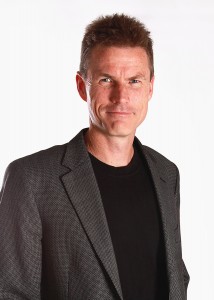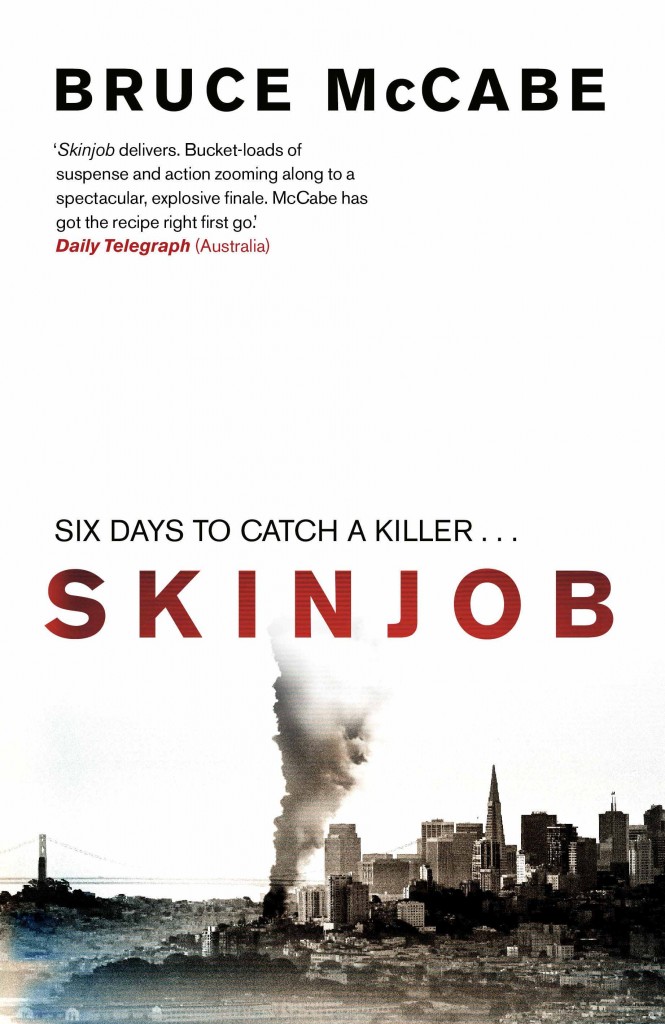Bruce McCabe was born in 1969 and lived in Kenya, Fiji and Japan before returning to Australia, where he graduated in science from the University of Sydney. He worked for a variety of tech firms before making his name as an international expert on human factors in technology adoption and innovation. Along the way he published several hundred magazine, journal and newspaper articles, became a provocative weekly columnist in The Australian and earned a PhD in computer science. He travels widely as a public speaker and advisor to businesses, governments and science labs, writes constantly, and lives in Sydney with his wife, two children and a Staffordshire bull terrier named Suzi. Skinjob is his first novel.
Bruce can be found online at: www.brucemccabe.com
Author Interview
Please tell us a little about the concept behind Skinjob — what led you to explore this topic and when and how did the initial idea materialise?
The initial spark came years ago when I attended a demonstration of software that listened to phone calls, analysing the inflections and stress patterns in a caller’s voice, then decided whether or not he was lying. I found it incredibly provocative! In Skinjob I decided to explore where this was going, especially with respect to policing, and what it might do to people. I went on to explore several other provocative themes, in particular where Silicon Valley takes pornography and the social consequences coming our way, but this was the start.
How long did it take you to write Skinjob? What methods did you employ to help you stay focused and on track during this time?
Three years. I’ve yet to find the methodology that works best for me: as I write the second novel I’m still doing a lot of experimenting! The most important factor, though, was relaxing into the process and making sure when I sat down to write, I enjoyed every moment. There is always a lot of rewriting and the first draft of anything is always rubbish, so if you can appreciate each stage for what it is, and not put too much pressure on yourself to ‘get it right’ first go, it isn’t hard to put all those hours in.
How do you choose the setting for a story? Why did you choose to set your novel in the San Francisco Bay area and how well did you know this area before you began to write?
It had to be San Francisco. So many of the themes relate to Silicon Valley, and San Fran is such a fantastic city. I knew it well from many visits. I also spent time there while writing, walking each of the streets and visiting all the locations depicted in the story, taking in sights, sounds and smells. This is a particular joy to me (and adds a whole new dimension to the pleasure of travel). I’ve just repeated the experience in Tokyo, for the next novel.
Could you talk a little about your own relationship with technology? Do you see the technological-social changes looming ahead primarily in a negative light or in a positive light?
Great question! Both. Whenever I look at a technology I see the good and the bad. I can’t help it. My work has trained me to winkle out contradictions and unexpected consequences. And there is so much drama to be discovered in those shades of grey. They make a great backdrop for storytelling. Overall, I’m a realist. If pushed, I would say I tend to be more optimistic than pessimistic about the future.
Your writing combines some aspects of science fiction with the crime-thriller genre. Is the social commentary element — so often associated with sci-fi — important to you as a writer? Do you hope your writing can serve as a kind of warning of what is to come?
The first duty is to entertain – I hate being bored and I don’t want my readers being bored, not for a single page – but beyond that making people think about the looming social issues is a big driver for me. All the technologies in Skinjob are real. Extrapolated, of course, but real. When someone comes up after a book talk and says they enjoyed the thrill-ride, that’s a win; when they say the family is debating it around the dinner table, that’s a big, big bonus.
You have been able tie together your professional life in technology and science with your writing life. In your opinion, how important or helpful is it to have a career outside of writing in regards to story-writing and idea production?
To my mind you need to have experiences to write about them. How you do it doesn’t matter. I try to spend time with interesting and clever people whenever I can. Probably, without knowing it, I’ve shaped my career to facilitate this. New ideas and insights are one benefit, but these relationships enrich my life far beyond the contribution they make to writing. Indeed, it is my sincere hope that writing opens the door to more relationships!
Excerpt from Skinjob
Chapter 1
The car squalled to a stop.
A haze of tyre smoke drifted in front of them. Jackson Street was one-way, and the traffic had funnelled down to a blocked intersection with nowhere to turn. Beyond the wall of backed-up vehicles, a black pall spread across the afternoon sky like ink. Shari knew every inch of these streets, every camera, angle and distance. They weren’t far. She got out and ran.
She arrived at the Grant Avenue intersection, legs and lungs burning. As she stood, hands on hips, gasping for breath, she saw a street from hell.
In the centre of what had once been a neat row of buildings was a yawning gap. The building was gone, replaced by a rubble pile belching thick black smoke. Fire trucks directed long jets of water into sputtering orange hot spots.
A group of people, brown with water and grime, huddled near the corner receiving first aid. Shari scanned for a police uniform. Nothing. Then she noticed bodies, two of them, right in the middle of the street. One was a woman, her arms and legs oddly twisted. No one had even bothered to cover her. The other was shielded by a pair of kneeling paramedics.
Shari moved closer, arms slack by her sides.
One of the paramedics shook his head. ‘No use. Too many damn holes.’
‘Don’t stop,’ said the other. ‘Sometimes they surprise you. Give me another bandage. No, unwrap it. My hands are slippery.’
‘Pressure here. Here!’
Shari could see now that the victim was – had been – a man. His right arm was missing to the elbow. If that had been his only injury he might have had a chance, but the entire right side of his body was black, the hair gone, and his face had ballooned into pillows of weeping flesh. Pink froth fluttered from a ragged hole in his chest, and through her daze Shari could see the bandages were useless against the flow.
The paramedic working the man’s chest was completely covered in blood. The other, his uniform caked with dirt, looked at his colleague with a resigned expression that said, Yes, sometimes they can surprise you, but not this one.
Shari bent and forced herself to stare, but there was nothing to recognize in the swollen, blistered mess that had once been a face. She took in the blood-soaked rags wrapped around the neck and shoulders. Grey pin stripes on white. Not a uniform. Not Adam.
The first paramedic stopped pumping. He leaned back and wiped his face with the back of his arm, smearing blood and sweat across his cheek. His colleague stood, took a breath, and mumbled a few words of prayer.


